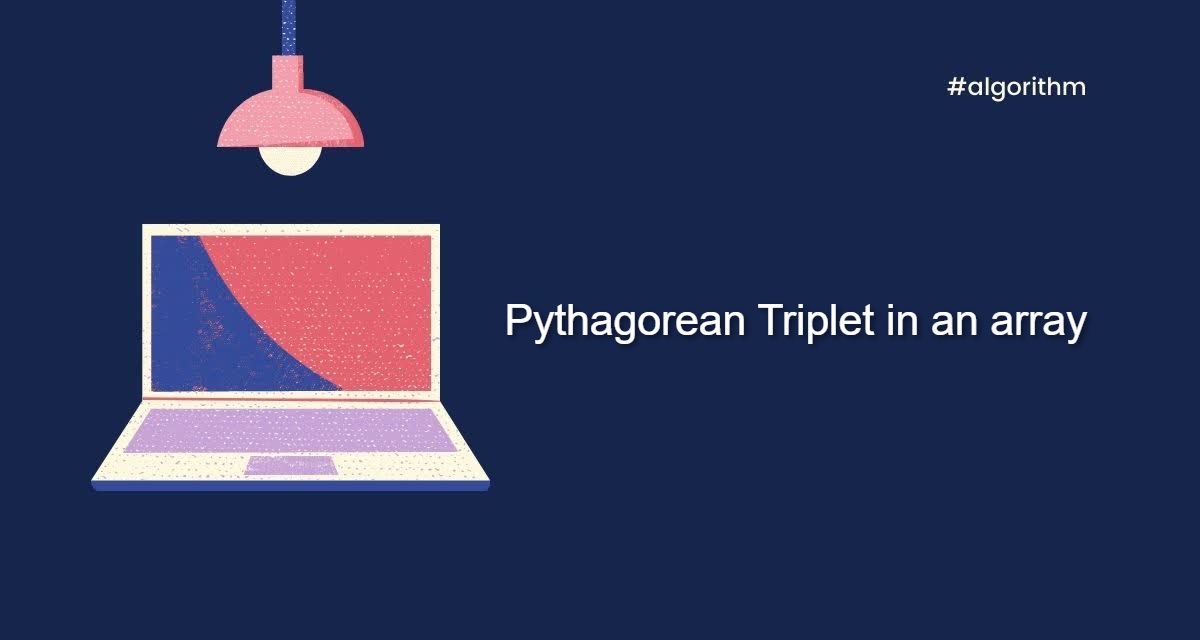 Logicmojo - Updated Aug 28, 2021
Logicmojo - Updated Aug 28, 2021
Problem Statement: Pythagorean Triplet in an array
Given an array of integers, write a function that returns true if there is a triplet (a, b, c) that satisfies a2 + b2 = c2.
Example: arr = [3, 1, 4, 6, 5]
Output: True, There is a Pythagorean triplet (3, 4, 5).
Approach 1: Brute Force
A simple solution is to run three loops, three loops pick three array elements, and check if the current three elements form a Pythagorean Triplet. Time complexity will be O(n3) i.e. not the optimal one so we need to optimise it.
Efficient: Using Hashing
The problem can also be solved using hashing. We can use a hash map to mark all the values of the given array. Using two loops, we can iterate for all the possible combinations of a and b, and then check if there exists the third value c. If there exists any such value , then there is a Pythagorean triplet.
C++ Implementation:
#include <bits/stdc++.h> using namespace std; bool checkTriplet(int arr[], int n) { int maximum = 0; for (int i = 0; i < n; i++) { maximum = max(maximum, arr[i]); } int hash[maximum + 1] = { 0 }; for (int i = 0; i < n; i++) hash[arr[i]]++; for (int i = 1; i < maximum + 1; i++) { if (hash[i] == 0) continue; for (int j = 1; j < maximum + 1; j++) { if ((i == j && hash[i] == 1) || hash[j] == 0) continue; int val = sqrt(i * i + j * j); // If c^2 is not a perfect square if ((val * val) != (i * i + j * j)) continue; if (val > maximum) continue; if (hash[val]) { return true; } } } return false; } // Driver Code int main() { int arr[] = { 3, 2, 4, 6, 5 }; int n = sizeof(arr) / sizeof(arr[0]); if (checkTriplet(arr, n)) cout << "Yes"; else cout << "No"; }
Python Implementation:
# Pythagorean triplet exists or not import math def checkTriplet(arr, n): maximum = 0 # Find the maximum element maximum = max(arr) # Hashing array hash = [0]*(maximum+1) # Increase the count of array elements # in hash table for i in range(n): hash[arr[i]] += 1 # Iterate for all possible a for i in range(1, maximum+1): # If a is not there if (hash[i] == 0): continue # Iterate for all possible b for j in range(1, maximum+1): # If a and b are same and there is only one a # or if there is no b in original array if ((i == j and hash[i] == 1) or hash[j] == 0): continue # Find c val = int(math.sqrt(i * i + j * j)) # If c^2 is not a perfect square if ((val * val) != (i * i + j * j)): continue # If c exceeds the maximum value if (val > maximum): continue # If there exists c in the original array, # we have the triplet if (hash[val]): return True return False # Driver Code arr = [3, 2, 4, 6, 5] n = len(arr) if (checkTriplet(arr, n)): print("Yes") else: print("No")
Time complexity: O( max * max ), where max is the maximum most element in the array.
Space complexity: O(n) for storing values
With this article at Logicmojo, you must have the complete idea of solving Pythagorean Triplet in an array problem.